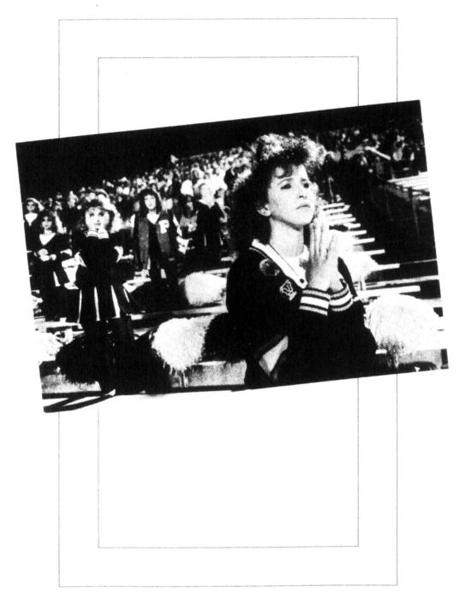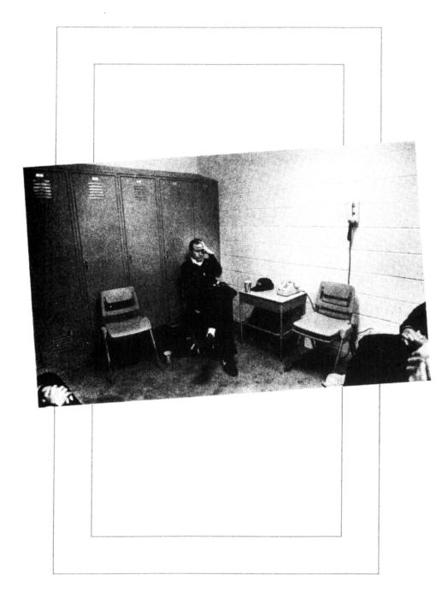Friday Night Lights: A Town, a Team, and a Dream (41 page)
Read Friday Night Lights: A Town, a Team, and a Dream Online
Authors: H. G. Bissinger
Tags: #State & Local, #Physical Education, #Permian High School (Odessa; Tex.) - Football, #Odessa, #Social Science, #Football - Social Aspects - Texas - Odessa, #Customs & Traditions, #Social Aspects, #Football, #Sports & Recreation, #General, #United States, #Sociology of Sports, #Sports Stories, #Southwest (AZ; NM; OK; TX), #Education, #Football Stories, #Texas, #History

At the barbershop and on the practice field and in restaurants, fans and parents and even the boys who played for him
had trouble looking Gaines in the face. He hadn't cheated anybody. He hadn't committed fraud. He hadn't physically harmed
someone. But it seemed as if he had violated some sacred public
trust.
"I got a different opinion of Coach Gaines," said Clint Duncan, the team's starting center. "I think he blew that game. I
just can't look at him, because it still makes me mad...."
How could he have called the plays he did? What had happened to him in the second half, going time and time again with
those plodding, thudding sweeps? Didn't he remember the gorgeous bomb Winchell had thrown in the second quarter, so perfect it was like something in a dream, Hill's splitting three
members of the Lee secondary like an ax to a log, and that ball
lingering in those lights as twinkling and gorgeous as a shooting
star? Hadn't he understood the power of that, the beauty?
The pressure had gotten to him, that's all Gaines's detractors
could figure. The idea of beating Lee was too much for him,
and that cocky son-of-a-bitch of a coach over there, Earl Miller,
with that twang of his as thick as a T-bone, had done it to him
again, sent him home like a scalded dog. Gaines had now not
beaten Lee in any of his three seasons-three seasons! If there
was anything more shameful to Permian fans, it was hard to
know what it could possibly be.
In the minds of those against him, the Lee game only proved
what they had suspected all along: under the heat of those Fri day night lights, lights that many a man had wilted under,
Gaines had gone big-time belly up.


And there were many who thought it was time to do what
had to be done, fire his butt and get someone else who could
make these kids into winners, restore some discipline to this
group that was too busy drinking their six-packs and getting
horny on Ecstasy and listening to all that strange rap shit over
their Walkmans to perform their job as football players for
Permian High School. Where the hell had Mojo pride been in
this game? Where had the fire in the belly been, the ability to
suck it up and play four quarters, to do whatever it took to get
the job done-all those things that had become part of the heritage of the town itself?
Following the circulation of the petition, a letter to the editor
appeared in the Odessa American that said the following:
No matter how talented the team, Gary Gaines will never take a
Mojo team to the state finals. What he said proves he is incompetent.
Quote: "It doesn't matter if you win or lose if two good teams are playing." Never in the history of sports has anything been more ludicrously
said. He talks like a coach, he acts like a coach, but he is not a football
coach. Gaines could take the untied, undefeated 1972 Mojo state champions and play Lee's worst team, and Gaines would lose. You can bet on
it. Around this area, there could have been several jackets with "state
champions" on them. I feel so sorry for all the teams that could have
had this. The downfall of mighty Mojo is going to be called Gary
Gaines.
There were many letters in the Odessa American, but none made
a more personal attack than this one.
Gaines himself tried to shield his wife from seeing the letter
because he knew that she would be hurt by it. They had been
living this kind of life for seventeen years now, ever since
Gaines had gotten his first coaching job in Fort Stockton, and
over time Sharon had built up a certain immunity. The FOR
SALE signs in the lawn didn't really bother her, since the same thing had happened before in Monahans. On that occasion she
had left a party over at the bank to get some ice when she
drove by the house and saw them. She quickly pulled them up
and threw them into the car, scratching it in the process. But
that was the price she had to pay for not letting her children
see them.
Her husband still knew that the hardest part of the criticism
wasn't what it did to him but what it did to his family. "That's
what I worry about," he said, "their ability to fight back at
things they don't have any control over, hearing things you
can't really refute, innuendos. I'm big enough to handle it. Certainly my hide's a little bit bigger than theirs is."
He hid the paper from her that night and put it in the trash,
but when she got to her job as an elementary school teacher the
next morning there were all these notes of condolences from
other teachers as if someone had died. She read the letter and
then called her husband. The second she heard his voice she
started to sob. She knew the endless hours he put in, getting up
at four-thirty every morning and often not getting home until
midnight. She knew that he cared about the kids as much as
any coach could within a system that demanded winning at virtually any cost. She knew the intolerable pressure he was under
during the season. She called the publisher and canceled their
subscription. The paper came for a few days after that, and her
husband, aware of how upset she was, quietly read it on the
porch instead of bringing it into the house.
Not every attack was so blatantly vitriolic as the letter, but
around town came the suggestion that it was time to bring back
the man whose initials had been A.G. when he had been here,
short for Almost God.
His real name was John Wilkins, and he was a cold, aloof man
with a pair of bottomless eyes that one coach up in the Panhandle said reminded him of Charles Manson's. Odessans had
never paid too much attention to his eyes, or to the fact that
many who played for him disliked him and felt little emotional
warmth for him. They looked at his record, 148 games won (55 of them by shutout), 16 lost, and two state championships
over a thirteen-year period that had ended at the completion
of the 1985 season, when he became athletic director for the
county.
Wilkins, when he had been the coach at Permian, had had a
very realistic view of his role. He knew that he wasn't close to
the players, and he knew he sometimes rode them harder than
he should. But he never believed the role of a coach was to
build character or lasting relationships. The role of' a coach
was to win, because this was high school football and this was
Odessa.
"You don't keep your job on how many good guys you turn
out," said Wilkins. "In this state, in this community, the bottom
line is how many games you win. All the other B.S. aside, a guy
can't stay out there unless he's really successful."
His nickname hadn't always been A.G. When Permian failed
to make the playoffs his second year in Odessa, there were
many who thought he had had ample opportunity to prove
himself and it was time to smoke his butt out of town. "It's
tough, it's tough for your wife and children to sit up there and
listen to some of the stuff they have to listen to," he said.
His pursuit to win a state championship became a ruthless
obsession, say those who worked for him, for he knew that anything less would not be enough. It wasn't uncommon for players to see him throwing up before a game because not only did
he want to win, he had to win.
"If you're gonna have a pleasant stay here, you need to win
some ball games," said Wilkins. "You need to win. I don't think
the school system would fire anybody. I don't think they'd have
to. The situation would become intolerable for a man and his
family."
When Wilkins was coach, fans had been afraid to speak during practice for fear he would shoot them down with those terrifying eyes and that lurched, stunted way he had of speaking,
the words coming out in tiny sentences with long pauses in between, as if he was physically straining to stop the coils of his body from bursting open. Wilkins also got absolutely livid when
something hadn't been done right, every now and then taking
the little cards that had diagrams of plays on them and throwing them in the air in exasperation. Many of the boosters had
felt intimidated by him. Many of the players had felt intimidated by him. After their careers were over they hated how he
barely even said hello to them anymore, as if they no longer
had value, as if all they had ever been were slabs of steak for
the voracious beast of Permian football.
In temperament, Gaines was the complete opposite of his
predecessor, for just as John Wilkins had been dubbed Darth
Vader by some of those who worked for him, so Gaines was
privately called Luke Skywalker. He did have many of the
qualities of the Star Wars hero, a kind of wholesome purity that
seemed too good to be true but was so natural as to make him
appear almost delicate.
"No high is higher and no low is lower than what this game
is, I'm tellin' you," Gaines said in the dressing room minutes
after the game against the Rebels had ended. "A year's worth
of work goin' down the tubes in a New York second."
A few minutes later Wilkins came in.
"Sorry, Coach," said Wilkins.
"Me too."
Gaines fell silent after that, looking boyish with his hand
propped against the side of his neck and his black PERMIAN cap
resting in his lap like a kitten.
Wilkins was quiet also. He stared at the floor and then pulled
out his pocketknife and started whittling his nails.
 II
II
"America can't even take care of America anymore," said Jerrod McDougal.
He had a shotgun lying across his lap and he was going hunting one fall afternoon with his dad and younger brother for white-tailed deer on a plot of land that seemed as vacant and
exotic as a moon crater. They were near the town of Girvin,
which had a population of' fifty and a closed-up store with an
outdoor concrete dance floor so smooth and sweet it seemed as
if it only could have been built for ghosts.
"We bombed Japan in World War Two, and now they're kicking our ass," said ,Jerrod, riding atop a specially built bench on
the back of a pickup that was a little like riding in it rickshaw.
"Our smartest kids are average compared with Japan's smartest kids."
The pickup truck bounced along a dirt road, past jagged bits
of rock that glinted like discarded razor blades, and strangling,
spurting limbs of mesquite, and brittle branches with half-inch
thorns like uncut fingernails, and draping braids of low-lying
cactus. Jackrabbits weaved in and out.